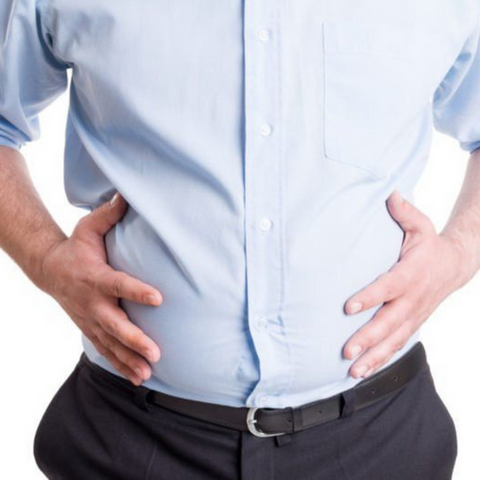
Feeling Bloated After Eating? Try These Fixes
You’ve just finished eating, and suddenly your stomach feels like it’s ballooned up? It’s not just in your head — stomach discomfort after meals is common. It can leave you feeling tight, uncomfortable, or even in pain. This happens because your digestive system is working hard to break down food, and certain habits or conditions can make it harder for your stomach.
In most cases, this feeling isn’t serious. But for some, it happens frequently — especially those with conditions like IBS or hormonal changes. Women often notice this discomfort more around their menstrual cycle. About 10–25% of people deal with it now and then, so you're not alone. Identifying the causes can help you feel better and keep your digestive system in check.
What Causes Bloating?
-
Too Much Fiber
Fiber is great for digestion, but consuming too much can cause gas and discomfort. High-fiber foods include beans, oats, lentils, broccoli, Brussels sprouts, apples, and oranges. -
Carbonated Drinks
Sodas, sparkling water, and beer contain carbon dioxide. The gas builds up in your stomach, leading to discomfort. Cutting back on these drinks can help. -
Food Sensitivities
Some people are sensitive to certain foods like dairy, wheat, peanuts, fish, or eggs. These foods can cause nausea, stomach pain, and gas. Avoiding problem foods can make a big difference. -
Celiac Disease
If you have celiac disease, eating gluten (found in wheat, barley, and rye) damages your gut. This can lead to discomfort, gas, and other issues. People with this condition need to follow a gluten-free diet. -
Gastroparesis
This condition slows digestion because the stomach muscles don’t work properly. It can cause nausea, vomiting, and discomfort. Managing gastroparesis usually involves dietary changes and medication. -
Gallstones
Gallstones are hardened deposits in the gallbladder that can block bile flow. This can cause nausea, pain, and discomfort after eating fatty meals. -
Indigestion
Eating too quickly, overeating, or consuming rich, fatty foods can cause indigestion. Symptoms include heartburn, cramps, and feeling full after eating small amounts. -
Irritable Bowel Syndrome (IBS)
IBS affects the large intestine and can cause gas, pain, diarrhea, or constipation. Managing IBS often involves changes to your diet and sometimes medication. -
Lactose Intolerance
If your body can’t digest lactose (the sugar in milk), eating dairy can lead to gas, discomfort, and diarrhea. Many people feel better by avoiding dairy or taking lactase supplements. -
Hormonal Changes
Many women experience discomfort during PMS or their menstrual cycle due to fluid retention. Staying hydrated, reducing salt, and managing stress can help ease symptoms. -
Small Intestinal Bacterial Overgrowth (SIBO)
SIBO occurs when harmful bacteria overgrow in the small intestine, leading to gas, discomfort, and diarrhea. Treatment often involves antibiotics or other medications.
How to Feel Better
If your discomfort isn’t caused by a medical condition, these tips can help:
- Sip Herbal Teas: Peppermint, ginger, chamomile, and fennel teas are great for digestion.
- Eat Slowly: Take your time and chew your food thoroughly to avoid swallowing air.
- Try Antacids: These can reduce inflammation and help with gas.
- Take Probiotics: These can balance gut bacteria and improve digestion.
- Use Peppermint Oil: It helps relax your stomach muscles and eases discomfort.
- Consider Magnesium Supplements: Magnesium relaxes intestinal muscles and eases constipation.
- Get Moving: Regular exercise, especially core workouts, aids digestion.
Stay Hydrated and Limit Certain Foods
Drinking at least 8 cups of water daily keeps your digestive system happy. Limit high-sodium foods (over 2,300 mg per day), fatty meals, and carbonated drinks to avoid unnecessary discomfort.
When to See a Doctor
Some discomfort is normal, but if it happens often or lasts a long time, it’s worth getting checked out. Also, see a doctor if this feeling comes with symptoms like:
- Severe abdominal pain
- Weight loss
- Fever
- Bloody stools
These could be signs of more serious issues like celiac disease, Crohn’s disease, or liver problems.
Nutri Intact brings you the best of nature with our rich and exotic selection of nuts, spices, edible oils, and more. We preserve nature's goodness so you can enjoy wholesome food in your everyday meals. The best way to appreciate our quality is to try it for yourself. Enjoy the earthy aroma while cooking, feel the improvements in your gut health, and experience the balance that true soul food provides.
We are proud to be an FSSAI-licensed brand (Lic. No: 11224333002597).




